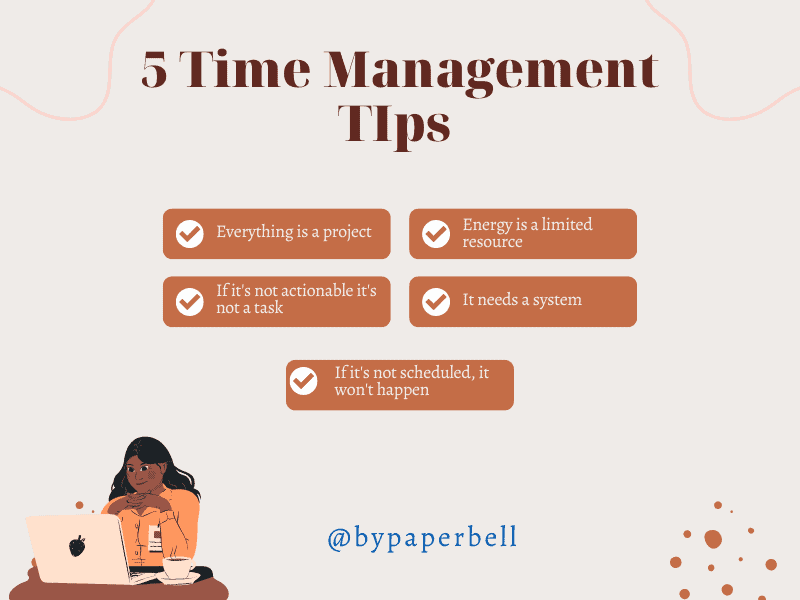As a coach, you know that time management skills are absolutely essential for running a successful practice. But here’s what most coaches don’t realize about time management: it’s way more than just cramming more client sessions into your already packed schedule.
We’ve gathered simple but effective strategies from years of working with thousands of coaches to help you create a well-planned, balanced practice that serves your clients without burning you out. The best part? These strategies work whether you’re just starting your coaching business or you’re already booked solid and looking to scale.
What Is Time Management?
Time management is the process of organizing, prioritizing, and planning your activities. But here’s the thing – this doesn’t just mean your coaching sessions and business tasks. It includes everything in your life:
- How you manage your household
- Your personal development goals
- Creative hobbies and downtime
- Even planning your weekly meals
When you nail time management, you suddenly have space for things that seemed impossible before – like actually meal prepping on Sundays or finally reading that book that’s been sitting on your nightstand.
Time is just a framework that helps us organize our energy and coordinate with others. When you manage your energy well, you maximize the value of every hour and spend it on what truly matters to your clients and your life.
💡 Pro tip: One of the biggest time drains for coaches? Admin work. Paperbell handles your scheduling, payments, contracts, and client management automatically, giving you back hours every week to focus on what you do best: coaching.
Top 3 Causes Of Poor Time Management
Lack Of Focus
If you’re struggling to finish things on time despite good planning, you might be dealing with distractions in your environment or mind. First, check if your workspace matches your needs . Some coaches thrive in complete silence while others need background music or the energy of a coffee shop.
If your environment is dialed in but you’re still struggling, look at the basics: are you getting enough sleep, exercise, and nutritious food? Regular breaks and even short meditation sessions can clear mental clutter and reset your focus. And if you’re experiencing daily fatigue or brain fog, don’t ignore it – check with your doctor because your health should always come first.
The Illusion of Progress
In our modern world of constant notifications and a never-ending stream of information, dopamine addiction has become the norm. Every time we receive a text or finish another video from the next online course, our brain neurons get fired up, wanting more.
We prioritize quick and easy tasks, putting the challenging tasks at the back of the queue. Why? Because we want our next dose of dopamine rush and think that we’re making progress. But oftentimes, we just keep distracting ourselves from what really needs our full attention. Distraction impacts how well we execute a task and how we practice time management.
Lack of Planning
Losing momentum could also come from insufficient planning and not being aware of your priorities.
Planning is the number one way you can practice good time management skills. Planning increases productivity and helps you stay on track and get things done. That doesn’t only apply to your professional life but has key benefits for your social life and free time too.
Do you know what you should focus on today, next week, and the weeks after? Do you have a daily planning system in place to optimize your life?
If not, read on for some time management tips that can help you work smarter and turn your bottomless to do list into balance, momentum, and clarity.
[ Read more: Free Coaching Toolkit: 27 Essentials to Run Your Practice ]
How to Get Better at Time Management

Now, let’s get to the real stuff. The following five steps will Marie Kondo your schedule so meticulously that once we’re done, you’ll wonder how you could ever live without a good time manager’s schedule.
You might not be able to toss out all duties that “don’t spark joy anymore,” but you’ll definitely feel more sorted with managing time by the end. So let’s get started.
Rule #1 — Everything Is a Project
We tend to think that only big projects for work and family weddings need to be planned out in advance. But guess what, everything that takes up space and time in your life, from a few weeks to several years, is a project. Getting better at project management will automatically help you develop time management skills.
List down everything that you put energy into in your life. From seasonal gift shopping and renovation projects to medical procedures and creative hobbies. You might be surprised how long that list will go on. If you’re more of a visual person, you can also draw this out as a mind map to see where these projects connect. Draw bigger bubbles for the ones that take up more space in your life to see them in contrast.
This exercise alone will bring awareness to where all that time “magically disappears” from your schedule. If you sit down to do this exercise and aren’t sure where your time goes, try using a time-tracking software for a week. If you track the time it takes for every task you do, it will give you a much clearer picture of how your daily tasks are spread out. It may turn out that simple tasks are taking you way longer than you think. A clear overview can help you build better habits and optimize for more productive activities.
Rule #2 — Energy Is a Limited Resource
It didn’t seem such a big undertaking when you applied for those cooking classes, and now you suddenly find yourself canceling on your friends for the third time in a row because you feel busy again. It’s time to prioritize all your small and big projects on your list and see which ones you can cross off from the bottom. Don’t worry, you’ll still be able to make all your dreams happen, just not all at once.
Think about what it would cost you to NOT do those projects right now, and you might find that they aren’t really as crucial as you thought them to be. Of course, don’t cross off everything from your list that brings you joy! Instead, divide them into two categories: the ones that give you energy and the ones that drain you. Try to eliminate, delegate, or outsource the ones that drain your energy, and you’ll definitely find more momentum for what really matters.
Rule #3 — If It’s Not Actionable, It’s Not a Task
We tend to underestimate how much we can do in a year and overestimate how much we can do in a month. Break down all projects on your list into smaller steps or stages, and then break the first one of these stages into hyper-specific tasks. This technique, also known as The Seinfeld Strategy, is a simple but powerful tool that will help you become more consistent.
“Do Christmas shopping” is not an actionable task — it would just make you wander around in a mall for a whole day, struggling to find what you need. Instead, you can break this subtask into smaller steps, such as listing gift ideas for family members, creating a budget plan, and researching the best shops and ecommerce sites where you can get these items.
If you’re an avid planner, you can do this exercise all the way until you know exactly what to do on each of your projects today, next week, or next month.
If that’s too much for you and you cringe at the sound of following an action plan, you can just make sure that you always know the overall outcome of your projects and the next actionable step that brings you closer to them.
The point is that you should never have to wonder what to do next and procrastinate on important activities because they seem too overwhelming. Goal setting and breaking things down into small, actionable chunks of work will help you get more tasks done quicker.
Rule #4 — If It Happens Again, It Needs a System
We all have our own systems in place for the tasks we do regularly, from the way we food prep for the week to our exercise routine. Take another look at your project list, and you’ll find that many of the things you do are recurring activities and, therefore, can be optimized.
Fixed time activities can be made to fit around your schedule instead of dictating it. For example, how much time could you save in a month if you found a gym closer to your home? How much could you cut from your time spent clearing your inbox daily if you got rid of those unnecessary newsletters?
Take a close look at the activities you do on a daily, weekly, and monthly basis, and look for ways you can make them more efficient. Consider investing in better tools and equipment that save you time, and explore ways you can share the load with other people. Working smarter this way will allow you to increase productivity and focus on the tasks with the utmost importance.
Rule #5 — If It’s Not Scheduled, It Won’t Happen
Effective time management skills include discipline and keeping promises you make to yourself and others. This is especially relevant for small business owners, who often find it easy to put things off until tomorrow.
Now you know exactly what to do next on each of your projects, so how come things still don’t move as fast as you want them to? Perhaps it’s because you’re overcommitting on a daily basis. To use time wisely, you need to be realistic about what you can achieve in an hour, a day, and a week.
If you have a long list of errands, block out a whole morning for them in your calendar next time. Schedule important and urgent tasks first as a “meeting with yourself” and be on time, as if it were a real meeting. Try to multitask as little as possible, and you’ll develop effective time management skills, leading to tremendous progress on your work and life projects.
[ Read: How to Pick The Best Scheduling Software for Coaches (8 Tools Reviewed)]
10 Time Management Hacks You Can Start Using Right Now
Here are ten tips you can implement straight away to improve your time management skills.
1. Airplane Mode Mornings
Jumping onto other people’s priorities first thing in the morning is the biggest time-waster. Keep your phone on silent instead, and don’t open your inbox until the most important task of the day is done.
2. Productivity Planners
You can find great journals called productivity planners that help you organize your daily and weekly tasks and reflect on your weekly progress. It’s one of the best investments you can make. Physically writing your daily tasks down in front of you make things see more real and are like making a little promise to yourself. Plus, you wouldn’t want to waste a page of your expensive planner now, would you?!
3. Shorter Meetings
If you have meetings or client sessions one after the other, you won’t get any time to take a break in between, and you’ll likely be late when one of them runs over. Work smarter, not longer!
One of the easiest ways to build good time management skills is to schedule 25 and 50-minute meetings with others, so they also know you need to wrap up 5-10 minutes ahead of the hour.
4. Clear Boundaries
If you’re a coach or a consultant, establish clear boundaries with clients on arriving at meetings on time, and have a 24-hour cancellation policy in place. This way, if the client is late, you still finish on time and get paid. They need to respect your time and build effective time management skills themselves.
5. Color blocking
Mark different types of meetings and activities in your calendar with different colors. For example, mark scheduled appointments in yellow and time-flexible activities in blue. Use green for your work schedule and professional life, and purple for your personal life. You get the idea.
That way, when you glance at your calendar, the most important tasks for that day will stand out, and you’ll immediately be able to see where you have some wiggle room.
6. Preparation Time
Proper time management involves preparation, which is arguably the most underestimated time management hack.
Your mornings will be way less rushed if you prep your food and clothes in advance. This will also help you to stick to any dietary changes or health goals you have. For instance, to start your vegan meal plan in the right way, you’ll be more likely to adhere to it if you prep everything ahead of scheduled mealtimes.
Also, researching for a project and preparing for a meeting should be blocked out in your calendar in the same way as everything else. Do you think that leaving things to the last minute will bring you less stress? We’ll leave you to answer that one for yourself.
7. Deep Work
Schedule deep work for tasks that take more time and energy. To achieve greater focus, turn your notifications off, play music that helps you concentrate, prepare your favorite brew, and consider setting a Pomodoro timer. Don’t let yourself be interrupted until you finish your task. Regular breaks are crucial too, but only take them when you feel like a natural pause crops up in the task at hand.
Focus is one of the most essential time management skills, and being able to cultivate it on tap, will seriously help your energy and productivity levels.
8. The 2-Min Rule
How to deal with unexpected tasks popping up and distracting you? If something can be done in under two minutes, just do it. If it takes longer, write it down on your to-do list immediately and get back to it later. Missed deadlines because you waste time responding to every request that comes in does not constitute good time management skills. Creating unimportant work, or “busy work,” for yourself can make you feel like you’re being productive when, in fact, you’re neglecting your most important tasks.
9. Don’t Be Afraid to Tweak Your Project Management Style
Giving your time management skills a complete overhaul all at once can be a daunting task. Don’t be afraid to use the time management tips in this list to suit your own energy levels and working style. If you try something and it doesn’t work out for you, try a different tactic until you discover what works for you.
10. Time To Celebrate!
We tend to just do and do, forgetting to take time to celebrate our progress. Schedule half an hour each week to list your biggest achievements and learnings from the week, and it will definitely give you a boost for the week to come!
Effective Time Management Skills Take Time!
So now we’ve answered the question, “why is time management important” you know that mastering time management will give you a better work life balance, help you to eliminate stress, and allow you to do more with less effort.
Don’t be hard on yourself if you feel you’re still a long way off from beating your poor time management skills. It’s a lifelong mission to master your time management skills, and struggling to stop procrastination and get straight into the task is difficult for many people.
Try the tips and examples of time management we’ve run through and see how you get on!










